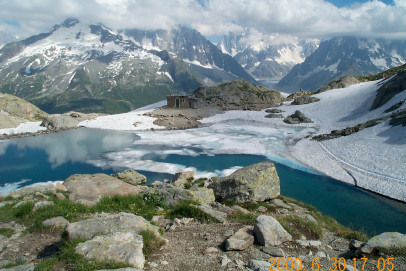 I'm not sure exactly what caused me to come to the decision to do a
study abroad program, but I knew that I wanted to study abroad at least
once during college. In the interest of graduating in a finite amount of
time, I was somewhat more curious about the programs which would let you
pursue your studies abroad, but perhaps with a relaxed schedule. I
wanted to experience something new and different, as well as leverage
some of my German language skills and visit friends in that area of the
world. Georgia Tech Lorraine provided an environment that looked good to
me, and it had only a few potential negative aspects (which turned out
to be non-issues).
I'm not sure exactly what caused me to come to the decision to do a
study abroad program, but I knew that I wanted to study abroad at least
once during college. In the interest of graduating in a finite amount of
time, I was somewhat more curious about the programs which would let you
pursue your studies abroad, but perhaps with a relaxed schedule. I
wanted to experience something new and different, as well as leverage
some of my German language skills and visit friends in that area of the
world. Georgia Tech Lorraine provided an environment that looked good to
me, and it had only a few potential negative aspects (which turned out
to be non-issues).
First, I didn't know any French whatsoever. Not only did I not know French, I did know that I have a negative proficiency for spoken languages other than English. I studied German for six years prior to coming to Georgia Tech, and I did reasonably well with most things written, but when it comes to understanding and speaking I don't have an extraordinary amount of talent. To be fair, I can still understand and speak a good bit of German, but I guess I just don't really feel as comfortable with new languages as some folks. Regardless, I decided to give GTL a try.
I am completely happy with my decision, but were I to do it again I think I would make some changes with regard to the language. If you are a student that's going to attend Georgia Tech Lorraine and you haven't ever studied French, you should at the least master the numbers, alphabet, and perhaps a few simple phrases before you leave (preferably with a French-speaking friend or audio tape type thing).
One of the interactions which I participated in countless times this summer was a visit to the neighborhood bakery. I love bread, and even more than that I appreciate fresh bread. I floundered around for the first couple of weeks with the "point and click" shopping method until I finally set down and learned the numbers. After this, the practical and financial aspects of obtaining fresh bread gave way to the secondary aspect of this transaction, which is small talk. I got lucky and found a bakery where the proprietor was at least bilingual, so we had the German language in common. She was a great language resource and really helped to improve my French, as well as providing interesting morning chatter.
My experience was that most French people are delighted when you attempt to converse in their language (unless it's a harried train conductor who probably speaks the train-conductor subset of ten languages). Being able to understand and communicate simple things like numbers and directions is invaluable.
Probably one of the most frequently asked questions that I received upon returning from other students was an inquiry into how much the trip cost. I haven't ever really put a dollar figure to everything, but I do have some advice for the fiscally conscious. Don't feel that you have to do everything this way, but this is how I would do it if I were to do it a second time.
One of the problems with digital cameras these days is that they still require you to download the pictures to a computer or some other permanent storage. Sony makes a digital camera that writes to mini-CDRs, although this method has both good and bad points. Devices like "digital wallets" that download all the pictures off of a flash card and throw them onto a hard drive seem like a great idea, especially if you could take two and back one up. The best solution is probably to have camera-based storage commiserate with your picture-taking rate and then bring a laptop for downloading each week.
Disposable point-and-shoot cameras definitely have their place, especially on a study abroad trip. With a $10 disposable camera, you have almost no real investment in equipment to get stolen, lost or damaged. Obviously you'd lose any pictures you might have taken, but that's a small price to pay compared to the cost of replacing most other photo outfits. Disposables are great for amusement parks, clubs, dances, bars, runnings of the bulls, and other fine locations where you might not want to risk whatever other photo equipment you might have.
Note that this isn't complete. I'm open to suggestions or questions; just send me an email. -Peter